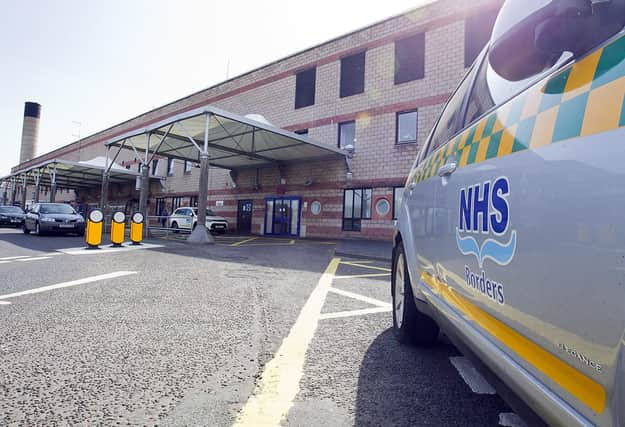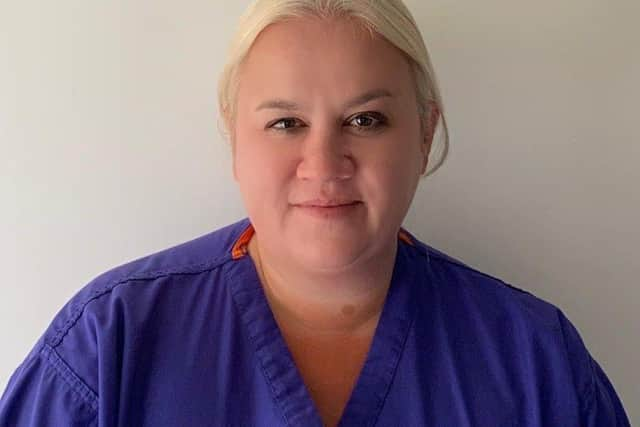Routine operations cancelled again


In the last seven days, more than 2,000 new cases have been recorded in the region, and there are currently 34 inpatients in hospital.
There are also reports of staff shortages, which has forced hospital bosses to issue a plea for already exhausted staff members to take on extra shifts.
Advertisement
Hide AdAdvertisement
Hide AdAnd patients who are in hospital awaiting care not currently available could be asked to agree to an “interim move".


Also, family and carers of inpatients who are unable to feed or dress themselves are being asked if they can come in to perform these functions to free up staff for more “clinical tasks”.
A spokesperson for the local health board said: “There is a very high demand for all our services, whether that is in Primary care or in our hospitals that are currently operating at over 95% capacity.
"Our services are also facing significant staffing challenges due to Covid-19, self-isolation and the normal winter illnesses.
Advertisement
Hide AdAdvertisement
Hide Ad“As a result we have put a number of measures in place to alleviate some of the pressure and would ask for the support and patience of our community over the coming weeks.
“Firstly we have taken the difficult decision to pause all routine operations scheduled for the rest of this week and affected patients are being contacted directly.
"Everything possible will be done so that all urgent, cancer and emergency surgeries will continue during this time. It is likely that we will need to continue to pause routine operating and a decision on this will be made as quickly as possible. We are also reducing the number of routine outpatient appointments during this period to focus staff on emergency, urgent and cancer services.
Secondly, we have now moved to essential visiting only across all of our sites for at least the next fortnight.
Advertisement
Hide AdAdvertisement
Hide Ad"You should only visit a loved one if it is classed as an essential visit, such as a birth partner supporting a women during hospital visits or a person receiving end-of-life care, and ensure that you take a rapid Lateral Flow Device (LFD) Covid-19 test before you come.
"If you are unsure whether your visit is essential or not, please review this guidance prior to contacting ward staff. The move to essential visiting will ease pressures on staff and help to protect our patients and staff from Omicron.”
A letter is being issued to all inpatients, and those who are receiving or waiting for Social Care, advising of the further steps which may need to be taken to ease the pressure.
The spokesperson added: “For people in hospital this sets out how we will be looking for their co-operation to agree an interim move for a period of time if they are waiting for care and this is not currently available.
Advertisement
Hide AdAdvertisement
Hide Ad"This is essential if we are to maintain capacity in our hospitals to admit new patients who require hospital care.
"We are also asking for family members or carers to consider whether they are able to provide support for things like eating and dressing while relatives are in hospital. This will help staff to undertake clinical tasks.
“We will continue to work closely with Scottish Borders Council, and other partners to maintain essential services as best we can, and to resume services we have paused as soon as possible.”
While Covid cases increase, NHS staff are not immune to becoming ill themselves, and it’s not been unknown for whole teams to be infected or having to self-isolate.
Advertisement
Hide AdAdvertisement
Hide AdThe spokesperson added: “The latest figures show that our staff absence rate as at January 4 was 6.7% (2.96% of which is Covid-19 related). During the winter months we would expect these levels of absences due to increased illnesses such as influenza and respiratory tract infections, however it is important to note that covid-related absence can have significant impacts on our services throughout the system if absence occurs in isolated clusters within our teams.”
Medical director of NHS Borders, Dr Lynn McCallum said: “Cases of Covid-19 in the community are rising sharply, and we expect this to continue over the coming weeks. Given how contagious Omicron is and the high numbers of people requiring care there are significant pressures on our services; particularly when we factor in staff absences due to the virus.
“To make sure that we are able to continue vital services during this challenging time, it has been necessary to make a number of difficult decisions such as pausing routine surgery and moving to essential visiting. General Practitioners and other primary care providers may also need to adjust the service they provide so that they can prioritise appointments and access for the most urgent and vulnerable patients.
“We are truly sorry to those that these decisions affect. However we hope that you understand that patient and staff safety is our top priority, including providing the highest quality of care and support. We can assure you that we are doing everything possible to keep our patients and staff safe, whilst keeping the situation under constant review.
Advertisement
Hide AdAdvertisement
Hide Ad“We request that all members of the public, whenever they are interacting with health services, take Lateral Flow Device (LFD) tests prior to attending health care settings as LFD tests help detect Covid-19 which enables us to limit the virus spreading.
“We would also ask that the public recognise that our staff are currently working under significant pressure and we are therefore very grateful for your co-operation and patience at a time when, despite our staff’s best efforts, we are not able to provide the normal quality of service that we would expect to do. We would like to thank our exceptional staff for their incredible ongoing efforts to keep our patients as safe as possible, at this very challenging time.”